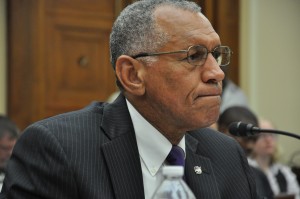
NASA Administrator Charles Bolden’s delay in deciding on a final Space Launch System design was called an “insult to Congress” during a House Committee hearing Tuesday. (Jacqueline Klimas/MEDILL)
WASHINGTON – NASA Administrator Charles Bolden came under fire Tuesday from Alabama congressmen for missing repeated deadlines to update Congress on the Space Launch System, despite more frequent and heated requests in recent weeks.
Bolden again faced tough criticism of his agency and the Obama administration at a House Space, Science, and Technology Committee hearing. He accepted all responsibility for delays of the Space Launch System, despite prominent committee members placing the fault in part on the White House.
“You have the right guy here to criticize,” Bolden said. “It’s not the president, it’s me.” He called the decision to select and move forward with a design for the SLS the most important decision he will make as the head of America’s space program, which is why NASA is proceeding with caution and trying to determine realistic costs before moving forward.
Reps. Mo Brooks, R-Huntsville, and Terri Sewell, D-Birmingham, grilled Bolden on the impact of the delays on jobs and funds for Marshall Space Flight Center, which was named the program office for the Space Launch System and is in Brooks’ district.
Bolden acknowledged that NASA employees at Marshall are anxious to get back into building rockets, but added that the work couldn’t continue with potential budget cuts like the 9 percent cut approved by a House Appropriations Committee last week. Bolden called the economy the biggest threat to American national security in space, but he is optimistically planning for funding to continue at its current level, creating work for Huntsville. “Given that level of funding, Marshall will have some robust activity coming up.”
That won’t happen until the final design has been approved by the Office of Management and Budget.
The design for the Space Launch System has been approved since June 20, said Bolden, adding that he has shared it with OMB and the White House. The Virginia consulting firm Booz Allen Hamilton has contracted with NASA to determine the feasibility of the costs and timeline for production of the heavy-lift vehicle.
Congress still hasn’t seen any design plans, though.
Despite direct requests from several representatives, Bolden dodged the question that compelled Congress to call the hearing in the first place, leading an exceedingly frustrated Rep. Sandy Adams, R-Fla. to cut to the quick.
“I just need to know: when can we see the plan?” said Adams. “When will NASA follow through with last year’s authorization?”
NASA is legally compelled to report to Congress on the progress of the new spacecraft systems, but reporting dates have come and gone with no final decisions presented.
Chairman Ralph Hall, R-Texas, stressed that the fault for these delays may lie closer to the White House than to NASA headquarters. Even so, he was at the end of his patience with Bolden.
“It shouldn’t take a year’s worth of deliberation,” Hall said. “We’re not asking, we’re begging, for information.”
That information may not come as quickly as the Congress would like.
When pressed, Bolden said he hoped to have a final decision on the Space Launch System design by late summer, but added that it could take longer.
Delays in the design process could extend the gap years between American-run space programs. With the end of the Space Shuttle Program, Americans will rely on Russian Soyuz rockets to take astronauts into low Earth orbit.
Bolden remains confident that commercial spacecraft will be ready to ferry astronauts to the International Space Station by 2015 and unmanned flights of the Space Launch System will begin in 2017, with the goal of carrying crew by the early 2020s.
